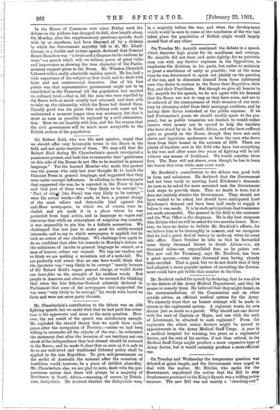Sir Robert Reid, who was the next speaker, urged that
we should offer very favourable terms to the Boers in the field, and not make martyrs of them. We may add that Sir Robert Reid during Mr. Chamberlain's speech interjected a passionate protest, and bade him to remember that "gentlemen on this side of the House do not like to be insulted in general language." Yet the learned Member who made this protest was the person who only last year thought fit to insult the Unionist Press in general language, and suggested that they were under corrupt influences. In alluding to the newspapers that supported the war, he is reported in the Times to have said that part of them were "very likely to be corrupt"— " Part of whiab. [the Press] was very likely to be corrupt" Were his actual words.—He made, in fact, a general charge of the most odious and detestable kind against the anti-Boer newspapers, in which we, of course, were in- cluded, and yet made it in a place where he was protected from legal action, and in language so vague and timorous that while an atmosphere of suspicion was created, it was impossible to pin him to a definite accusation. We challenged him last year to make good his subtly-worded innuendo, and to say to which newspapers it applied, but he took no notice of our challenge. We challenge him again to do so, confident that after his remarks in Monday's debate on- the unfairness of insults in general language he cannot, as a man of honour, refuse our request. We beg our readers not to think we are making a mountain out of a mole-hill. We are perfectly well aware that no one here would think that the Spectator was "very likely to be corrupt" merely because of. Sir Robert Reid's vague general charge, or would doubt our bona:Pies on the strength of his reckless words. But people in America and abroad might be excused for thinking that when the late Solicitor-General solemnly declared in Parliament that some of the newspapers that supported the war were "very likely to be corrupt," his words were based on facts and were not mere party rhetoric.






































 Previous page
Previous page